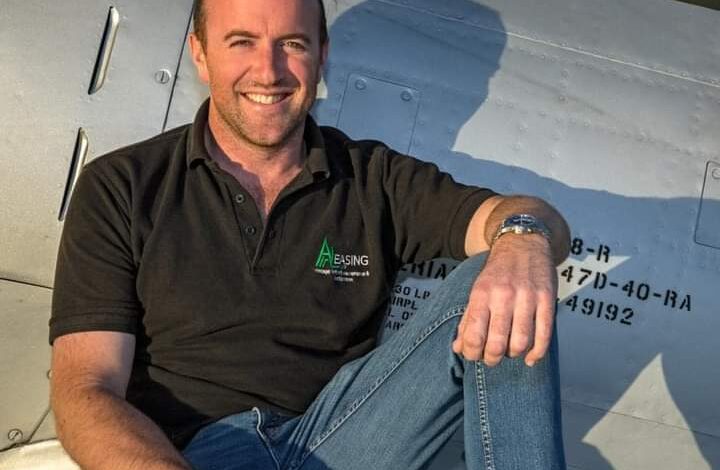
Richard Grace Obituary, Death: Richard Grace, Renowned Pilot of the Iconic Supermarine Spitfire Fighter Aircraft, Dies at 41 on October 15, 2024
Richard Grace Obituary, Death: Richard Grace, Renowned Pilot of the Iconic Supermarine Spitfire Fighter Aircraft, Dies at 41 on October 15, 2024, Leaving Aviation Community in Mourning
Richard Grace, a celebrated and highly skilled pilot known for his mastery of the historic Supermarine Spitfire fighter aircraft, tragically passed away on October 15, 2024, at the age of 41. His death has left a profound void in the aviation world and beyond, with countless hearts shattered by the loss of a remarkable aviator, husband, father, and friend. The announcement of his passing was made by his family and the team at The Grace Spitfire, expressing their deep sadness over the loss of a man who had become a symbol of dedication and passion for preserving aviation history.
Richard Grace’s passing marks the end of an era for enthusiasts of the Supermarine Spitfire and for those who appreciated the legacy of vintage aircraft. The announcement made on the Grace Spitfire’s Facebook page shared the heartbreaking news, stating, “We are profoundly sad to announce that on the evening of October 15th, 2024, Richard Grace lost his stoic battle with an ongoing illness. Richard leaves behind his wife Daisy, their two children, Allegra and Stirling, and his sisters Olivia and Nicola. More information will be given when appropriate. His immediate family, and his wider family at Air Leasing and Ultimate Warbirds Flights, would like to request your respect in giving them the space and privacy they need to grieve this terrible loss.”
Born into a family with a deep connection to aviation, Richard Grace was destined to become a pilot. His father, Nick Grace, was a renowned pilot and restorer who had restored the iconic Spitfire ML407, also known as “The Grace Spitfire.” This aircraft, originally built in 1944, played a significant role during World War II, having completed 176 operational sorties and 319 combat hours. Richard’s father flew the restored aircraft at airshows and historic events, captivating audiences with its remarkable history and performance. Following his father’s untimely death in 1988, Richard and his family continued to honor the legacy of the ML407, ensuring that the Spitfire’s legacy was not forgotten.
Richard Grace took up the mantle with remarkable skill and dedication, becoming a leading figure in the world of historic aviation. His passion for flying and the preservation of wartime aircraft was not just a profession but a way of life, deeply rooted in his family’s heritage. As the chief pilot at Air Leasing and Ultimate Warbird Flights, Richard played a pivotal role in bringing history to life, providing thrilling flight experiences to those who wished to connect with the past. His mastery of the Spitfire was legendary, with many describing his performances as breathtaking displays of precision and grace. Audiences at airshows would often watch in awe as Richard maneuvered the historic aircraft through the skies, bringing history to life in a way that few could.
Richard’s commitment to honoring the legacy of the Spitfire and its wartime heroes extended beyond his flying skills. He was deeply involved in the ongoing restoration and maintenance of vintage aircraft, ensuring that these pieces of history were not only preserved but kept in a condition that allowed them to continue flying. His work at Air Leasing, based at Sywell Aerodrome, was widely respected, with many in the aviation community recognizing the passion and dedication he brought to his craft. Under his stewardship, the company became a hub for historic aviation, attracting enthusiasts from around the world who shared his love for vintage aircraft and the stories they represented.
The Grace Spitfire itself, the ML407, holds a special place in aviation history. Originally constructed in early 1944 at Castle Bromwich, the aircraft served with distinction in the final year of World War II, flying with six different squadrons of the Royal Air Force’s 2nd Tactical Air Force. It was first delivered to 485 New Zealand Squadron on April 29, 1944, where it became the personal aircraft of Flying Officer Johnnie Houlton DFC. Houlton was credited with shooting down the first enemy aircraft over the Normandy beachhead on D-Day, June 6, 1944, while piloting the ML407. This historic feat, along with its many other sorties, cemented the Spitfire’s place in the annals of aviation history.
Richard Grace’s connection to the ML407 was not just about flying a historic aircraft; it was about honoring the memory of the brave pilots who flew during World War II and ensuring that their legacy lived on. His work with The Grace Spitfire became a personal mission, as he dedicated himself to sharing the stories of the aircraft and the men who flew them. It was not uncommon for Richard to engage with audiences after a flight, taking the time to share anecdotes, discuss the history of the Spitfire, and explain the intricate details of piloting such an iconic aircraft.
His loss has been felt across the aviation community, with many taking to social media to share their memories and condolences. Tributes have come from fellow pilots, aviation enthusiasts, and those who had the opportunity to meet him or witness his skill in the cockpit. The common thread in these tributes is the acknowledgment of Richard’s dedication to his craft and the impact he had on preserving aviation history. The news of his passing has left a profound sense of loss among those who respected and admired him, not only as a pilot but as a custodian of a unique and cherished legacy.
In addition to his professional achievements, Richard Grace was a devoted family man. His wife Daisy and their two children, Allegra and Stirling, were his pride and joy, and his love for them was evident to all who knew him. Richard often spoke about the importance of family, and despite the demands of his career, he always made time for his loved ones. The bond he shared with his family was a source of strength and support, particularly in his later years as he battled illness. His passing leaves an irreplaceable void in their lives, and the thoughts and prayers of many are with his family during this difficult time.
Richard’s contributions to the field of historic aviation will not be forgotten. His dedication to preserving the legacy of the Spitfire and sharing it with the world has inspired many, and his work will continue to influence future generations of aviation enthusiasts. Plans for his funeral and memorial services have not yet been announced, but there is already talk of organizing a special tribute flight to honor his memory. It is expected that the Grace Spitfire, the aircraft that Richard loved and dedicated his life to, will play a central role in these tributes, symbolizing his lifelong commitment to historic aviation.
As the aviation community continues to come to terms with this loss, there is a sense of gratitude for having witnessed the passion and dedication of a man who lived his life to the fullest. Richard Grace’s legacy will live on in the skies, in the stories he shared, and in the hearts of those who had the privilege of knowing him. His life serves as a reminder of the enduring power of history and the importance of preserving it for future generations.
The passing of Richard Grace is not just a loss for his family and friends but for the entire aviation community. It is a reminder of the fragility of life and the importance of cherishing every moment. While his time may have been cut short, the impact he had on the world of aviation will endure. His contributions to historic aviation, his dedication to the preservation of vintage aircraft, and his passion for sharing history with others have left an indelible mark on all who knew him. As the community grieves, there is also a deep sense of appreciation for the legacy he leaves behind—a legacy that will continue to inspire and educate for generations to come.



